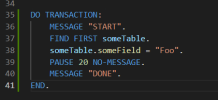Time_Traveller
New Member
Hello Progress Community,
im currently using progress 12.2 running on Linux Ubuntu 20.04.3 LTS (Focal Fossa) and access it via JDBC and ABL-Sessions.

(Promon screenshot showing the connections)
So i did the following test:
1) Open a transaction via JDBC, change a Record via SQL `UPDATE` and then wait 20 Seconds before rollback.
2) Read the same record (NO-LOCK) with the ABL-SESSION (via ABL `FIND`)
3) I can see the changes which should not be persistent at this time
4) After the Rollback the record shows no changes anymore.
I set transaction isolation level read commited.
I also disable auto commiting for the SQL Transaction.
Does the Isolation Level only control the READS from the Database? And not the Data which is currently written by my own session?
The definition of "TRANSACTION ISOLATION" from ibm says quiet differnt to the defintion of progress.
Any Ideas how to solve this? I don't want my changes to be visible from outside my own transaction ...
im currently using progress 12.2 running on Linux Ubuntu 20.04.3 LTS (Focal Fossa) and access it via JDBC and ABL-Sessions.

(Promon screenshot showing the connections)
So i did the following test:
1) Open a transaction via JDBC, change a Record via SQL `UPDATE` and then wait 20 Seconds before rollback.
2) Read the same record (NO-LOCK) with the ABL-SESSION (via ABL `FIND`)
3) I can see the changes which should not be persistent at this time
4) After the Rollback the record shows no changes anymore.
I set transaction isolation level read commited.
I also disable auto commiting for the SQL Transaction.
Does the Isolation Level only control the READS from the Database? And not the Data which is currently written by my own session?
The definition of "TRANSACTION ISOLATION" from ibm says quiet differnt to the defintion of progress.
Any Ideas how to solve this? I don't want my changes to be visible from outside my own transaction ...
Last edited:


